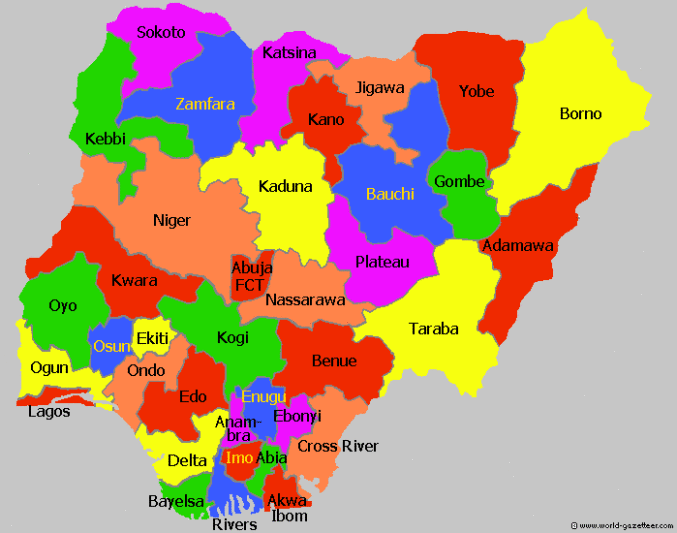Nigeria
Nigeria is situated in the West African region and lies between longitudes 3 degrees and 14 degrees and latitudes 4 degrees and 14 degrees. It has a land mass of 923,768 sq.km. It is bordered to the north by the Republics of Niger and Tchad; it shares borders to the west with the Republic of Benin, while the Republic of Cameroun shares the eastern borders right down to the shores of the Atlantic Ocean which forms the southern limits of Nigerian Territory. The 800km of coastline confers on the country the potentials of a maritime power. Land is in abundance in Nigeria for agricultural, industrial, and commercial activities.

Nigeria’s Ethnic Diversity and Population Composition
Nigeria, located in West Africa, is a nation known for its rich cultural diversity. It is home to a large number of ethnic groups, with the Hausa-Fulani, Yoruba, and Igbo being the three largest, representing approximately 70 per cent of the population. Additionally, there are several other significant groups, each with over a million members, such as the Kanuri, Tiv, and Ibibio. The remaining 20 per cent of the population is comprised of over 300 smaller ethnic groups. Despite the differences, these groups share commonalities that create a sense of unity among Nigerians.
Hausa-Fulani
The Hausa-Fulani people are primarily found in northern Nigeria. They have a rich cultural heritage and are known for their trading and agricultural practices. The Hausa-Fulani embrace Islam as their predominant religion and have made significant contributions to Nigeria’s political landscape.
Yoruba
The Yoruba people predominantly inhabit the southwestern parts of Nigeria. They have a diverse cultural heritage, with a rich history in art, music, and traditional religion. Yoruba society is known for its intricate social structures and is deeply rooted in its indigenous beliefs.
Igbo
The Igbo, also known as Ibo, are concentrated in the southeastern states of Nigeria. They have a vibrant culture with a strong emphasis on education and entrepreneurship. The Igbo people have contributed significantly to Nigeria’s economic development, particularly in commerce and industry.
Other Significant Ethnic Groups
Apart from the major ethnic groups, Nigeria is home to several other significant groups. These include the Kanuri, Tiv, and Ibibio, among others. Each of these groups has its own distinct cultural practices, languages, and traditions.
Language Diversity in Nigeria
Nigeria is linguistically diverse, with over 400 native languages spoken across the country. While English serves as the official language and is widely spoken, especially among the educated population, many native languages face the threat of extinction. Efforts are being made to preserve and promote indigenous languages to maintain Nigeria’s linguistic heritage.
Population Statistics and Size
Nigeria has the largest population in Africa, and its people have one of the highest population densities in the world. The country’s population is characterized by a relatively high birth rate and a significant youth demographic. January 2024, the population of Nigeria was estimated to be 226,166,443 people. This is an increase of 2.67 % (5,875,168 people) compared to population of 220,291,275 the year before. In 2023 the natural increase was positive, as the number of births exceeded the number of deaths by 5,952,270.
Religious Diversity in Nigeria
Religion holds great importance for the Nigerian people. Christianity and Islam are the two dominant religions, practiced by approximately 90 percent of the population. The remaining 10 percent encompasses various indigenous religions and a mix of other beliefs. Nigeria’s multi-ethnic culture has historically been home to various religions and deities, including ancestral worship practiced by many tribal groups.
Nigeria National Anthem

National Anthem
Nigeria is situated in the West African region and lies between longitudes 3 degrees and 14 degrees and Nigeria
latitudes 4 degrees and 14 degrees. It has a land mass of 923,768 sq.km. It is bordered to the north by the Republics of Niger and Tchad; it shares borders to the west with the Republic of Benin, while the Republic of Cameroun shares the eastern borders right down to the shores of the Atlantic Ocean which forms the southern limits of Nigerian Territory. The 800km of coastline confers on the country the potentials of a maritime power. Land is in abundance in Nigeria for agricultural, industrial and commercial activities.
National Anthem
- Nigeria, we hail thee, our own dear native land,
Though tribes and tongues may differ, In brotherhood we stand
Nigerians all, and proud to serve, our sovereign Motherland. - Our flag shall be a symbol, That truth and justice reign,
In peace or battle honoured, And this we count as gain,
To hand on to our children, A banner without stain. - O God of all creation, Grant this our one request.
Help us to build a nation, Where no man is oppressed,
And so with peace and plenty, Nigerians may be blessed.
National Pledge
I pledge to Nigeria my Country
To be faithful, loyal and honest
To serve Nigeria with all my strength
To defend her unity
And uphold her honour and glory
So help me God.
